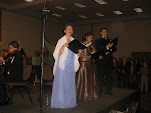In order for me to best assist you in your quest to be a better singer, I need to know a few things about your health and activities. I will only use the information for assessing your personal situation, and will not share the information with anyone. Please be as open and honest as you feel you can.
Yes No Do you have braces?
Yes No Have you ever had braces?
Yes No Do you have any dental apparatus (retainer etc.) or rubber bands in your mouth?
(Please be prepared to take out any removable apparatus- especially rubber bands, as you will not be able to open your mouth as needed, and the rubber bands can break or come off, and could cause you to swallow it or choke on it.)
Yes No Have you had a history of jaw problems? (TMJ or other pain)
Yes No Have you ever been diagnosed with vocal nodules (nodes) polyps, or any other kind of vocal abnormality? When, and how was this problem resolved?_____________________________________
Yes No Have you ever had surgery on your nose or throat?
If so, what kind and when?_______________________________________________________
Yes No Have you had a history of asthma or any other breathing problem?
Yes No Have you suffered from dizzy, fainting spells or seizures?
Yes No Do you have any blood sugar or other problems that may cause you to faint or black out during lessons? (If this is the case, please be prepared to bring extra snacks, medicine, water etc, to prevent or take care of this problem.)
Yes No Do you have any known allergies. (environmental, animal etc.)_____________________
Yes No Are you on any medication that may interfere with your performance in lessons?
Yes No Do you have any other health problems that may interfere with your performance in lessons? (Migraines, Sjorgens, etc)
Yes No Do you have any special needs that may need to be attended to during lessons? (ADD, dyslexia etc.)
Is there any other health related issue that may affect the student’s performance in lessons?
____________________________________________________________________________________
____________________________________________________________________________________
Signed:
______________________________________________ ________________________
Parent/Guardian Date
______________________________________________ ________________________
Student Date
HERE ARE SOME ACTIVITY QUESTUIONS YOU MAY WANT TO ASK:
Activities
Do you currently play any sports? If so, what?______________________________________________
What sports have you played in the past?___________________________________________________
What musical instruments have you played, for how long?_____________________________________
____________________________________________________________________________________
Have you ever taken private voice lessons before, if so, from whom and for how long?
____________________________________________________________________________________
How long ago was your last lesson?_______________________________________________________
What are other hobbies or activities that you participate in?____________________________________
What church or civic volunteer activities do you participate in?_________________________________
____________________________________________________________________________________



